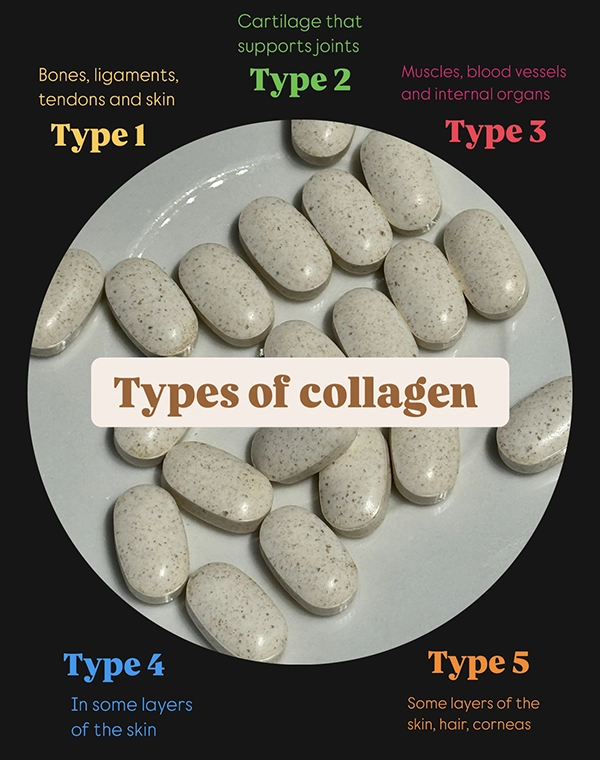What type of collagen is the most effective?
Collagen supplements

Different collagen types
Type I collagen
In the human body this collagen takes about 90% of the body’s total collagen. It is made of densely packed fibers. It is found in skin, bones, tendons, ligaments, corneas, and interstitial tissues. This collagen is vital for skin elasticity and firmness. A reduction in type 1 collagen with age contributes to wrinkles and sagging skin. It is the primary collagen in bones, so it’s important for bone strength and density. Reduced levels can lead to osteoporosis. It is involved in the wound healing process due to its role in forming scar tissue.
Type II collagen
Type 2 collagen is composed of loosely packed fibers, which are less dense than type 1. It is found mainly in cartilage, including articular cartilage (the cartilage that covers the ends of bones in joints) and the vitreous humor of the eye. It is essential for maintaining cartilage health. It’s important in managing osteoarthritis and other joint-related conditions. Studies suggest that type 2 collagen can help modulate the immune response in autoimmune conditions like rheumatoid arthritis by inducing immune tolerance to collagen, potentially reducing inflammation.
Type III collagen
Type 3 collagen is often found alongside type 1 collagen. It is composed of reticular fibers, which form a fine meshwork. Collagen type 3 is present in skin, blood vessels, intestines, and the uterine wall. It is important for the elasticity and structure of blood vessels. Deficiency or mutation can lead to conditions like Ehlers-Danlos Syndrome (particularly the vascular type), characterised by fragile blood vessels that are prone to tear.
Type IV collagen
Collagen type 4 forms a sheet-like network, rather than fibrils, giving support for cells and tissues. This collagen is found in the basement membranes, which are thin, sheet-like structures underlying epithelial and endothelial cells (e.g., in the skin, kidneys, and blood vessels). It is a key component of the glomerular basement membrane in the kidneys, which is important for filtering blood. Mutation or damage to type 4 collagen can result in conditions like Alport syndrome, leading to kidney failure. It supports the epidermis and is important for the barrier function of the skin.
Type V collagen
Type 5 collagen forms fibrils that are often thinner and less organised than those of type 1 collagen. You can find it in the skin, cornea, placenta, and in the walls of blood vessels. Mutations in this collagen can lead to classical Ehlers-Danlos Syndrome (EDS), a genetic disorder characterised by hypermobility, hyperextensible skin, and fragile tissues. Type 5 collagen is necessary for corneal transparency and overall eye health. Abnormalities can affect vision.

Book your collagen induction treatments at Beauty Bar salon in Hertfordshire
Now when you understand the specific roles and benefits of each type of collagen, you can choose the appropriate supplements based on what would you like to support. Your skin, hair or joints 🙂
Type I is best for skin health, bone density, and wound healing.
Type II is essential for joint and cartilage health, and beneficial in managing osteoarthritis.
Type III is important for vascular and internal organ health, as well as tissue repair.
Type IV is important for the integrity of basement membranes, affecting kidney function and skin barrier.
Type V plays a role in skin structure, corneal health, and can be implicated in certain genetic disorders like Ehlers-Danlos Syndrome.
Collagen type 1 and 3 are responsible for your skin looking young and wrinkle free. Production of collagen can be boosted by treatments like microneedling, RF needling, and skin boosters or mesotherapy. If you are interested to learn about what treatments may benefit your skin, just drop us an email or book a consultation at Beauty Bar in Ware Hertfordshire.